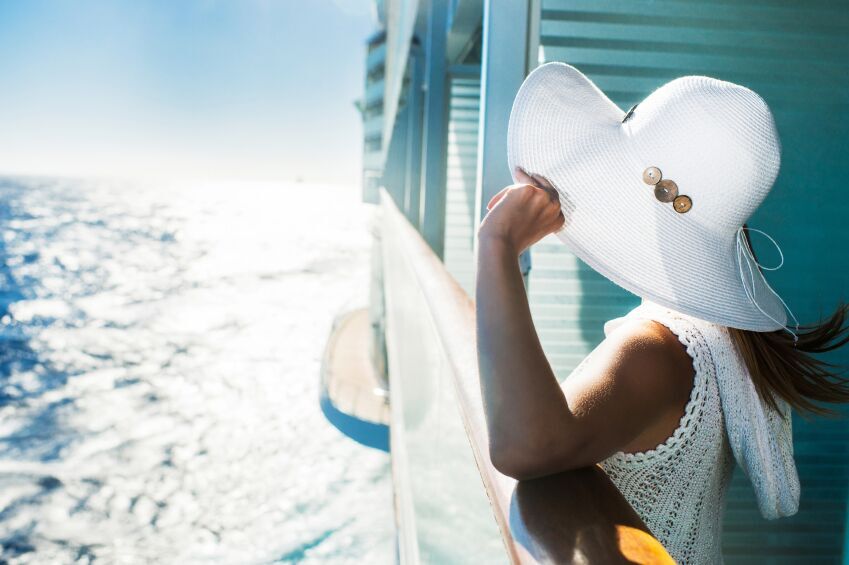Probably, only young children have never heard of superstition related to the female sex and sea transport. "A woman on a ship - unfortunately," is an ancient belief. What is this connected with and what is the history of such superstition?
Woman on a ship: is it such a rarity?
It’s not a secret to anyone that mostly men are found on ships. Of course, passenger and excursion vessels are not taken into account, where gender is not so important, and the sex ratio is not at all obvious. But on merchant and military ships (and one still must not forget about pirate ones!) The female gender is indeed a rare, almost exceptional phenomenon. One can hardly imagine a woman - the captain of a ship (although there are several of them in the world; there will be a special discussion about them a little later) or a boatswain in a striped vest. This profession is still purely male, requiring more endurance and stamina than is inherent in women. However, even on such ships a lady, as a rule, has a place. What kind of work can a woman have on a ship?
Weak sex
We will return to the captains of ships in skirts, but for now we’ll talk about other specialties that are more suitable for the female sex and can be useful at sea. It’s not necessary to go far and think for a long time: of course, first of all, it’s a ship cook! Or a cook, in simple terms. It is women who mainly fulfill the duties of cooks on ships - no, of course, there are men among them, but there are more women. So it has been led from time immemorial, since ancient times, and even in literature it is full of such examples.

Who else can a woman work on a ship? A waitress in a restaurant, a bartender, a maid, an administrator, a cleaning lady - in general, all that is now called "attendants". It’s not very easy to get on a ship - firstly, you need to have appropriate work experience onshore, secondly, you need to know a foreign language (mainly, of course, English), have international service standards, have stress resistance and goodwill. And such serious demands are made simply to the cook or the waitress - what can we say about the woman who decided to take her place on the captain’s bridge? .. Oh yes, and most importantly: you need to really love the sea to connect your life with it.
Who came up with the sign?
No one knows for certain with whose light (or, perhaps, vice versa, heavy) hands, a humorous omen about a cursed female who brings only grief to the sea began to walk around the world. Only a lazy person does not know that a woman on a ship is a bad omen, and this superstition has been living for centuries. Even in the present, such a progressive century, many believe and obey him - despite the fact that women nonetheless constantly go to sea.
However, we will return to the question of whether this sign is justified later. In the meantime, you should still try to find out what events triggered such a fiction.
A sign about women on a ship: what was hidden behind her?
Oddly enough, but the source of life of this superstition does not exist in a single copy. There are at least five different versions of why the sign of a woman on a ship found her life. And they all have every right to exist. It is impossible to say exactly where the “legs are growing” and “the wind is blowing” from - everyone chooses the most preferable and plausible option for himself. What if they are all true? ..
British forethought
English is international not only on land. Sea wolves also solve their interstate issues on it. And in the British language the ship has several names, and any of them is feminine. Just like a woman, she (that is, "she") from time immemorial, British sailors turned to their ship. They believed that each ship had its own soul, and they called this soul a female - after all, women are always treated with condescension: the weaker sex is weak in order to forgive it and help it. So, sea spirits and natural forces will not be touched, in which case the ship where the female soul reigns. For the same reason, watercraft were called by female names, they were cared for, guarded. And that is precisely why they in every possible way prevented a woman from ascending the ship: after all, they will become rivals with the soul of the ship, rivals for male attention. Which, of course, was originally aimed exclusively at the ship, but which could weaken and switch to an insidious sorceress and seductress. Then jealousy will begin on the part of the ship 's female soul - and who knows what troubles all this catavasia can turn into. Therefore, it is better not to let women on the ship, as sailors of ancient times reasoned. And if it happened that an extraneous beauty still appeared on the ship, and it fell into the storm, the brave sailors could do nothing more and throw the unfortunate woman overboard, because for a long time everyone has known that sacrifice is the best way to appease natural forces. Who else to sacrifice than a woman?

And in Denmark, in the middle of the sixteenth century, in accordance with this maritime custom, even a royal decree was issued stating that there would be a categorical ban on the appearance of ladies and ... pigs on any ship. If this still happens, the disobedient should be immediately drowned. Obviously, they did. In our time, at least they do not drown - they have become more humane, more humane.
Deity worship
Partly with the aforementioned version of the signs that a woman on a ship is in trouble, the following interpretation is also associated. At all times, sailors (and this began with the ancient Phoenicians and no less than the ancient Greeks) worshiped the deities - Poseidon and Neptune, the lords of the sea - and tried their best to please them. The lords had problems with the female sex - the goddesses tried to twist and twirl them, as you like.
They delivered a lot of problems to the unfortunate gods, in general. Consequently, Poseidon and Neptune should not be angry by taking women on board - that is, those from whom the gods have only trouble.
Church ban
This version, unlike the previous ones, is associated with Ancient Russia and has rather long roots in the Christian past. The thing is that in those distant, ancient times, women recognized the church as sinners, harlots, the source of evil and all kinds of misfortunes in the church - the list goes on and on. This alone did not add to the brave sea wolves the desire to travel side by side with such devils. But not only that: they, being devout people, could not do this, even if they suddenly really wanted to. The fact is that before the ship was sent aboard, the clergyman rose without fail. He blessed the ship and its crew on a journey, and also sprinkled the entire perimeter of the ship with holy water. After such a procedure, not a single female soul was even allowed to step on the ladder. And since it was not only men who were pious, very few dared to violate such a ban.
Male attention
This version of the origin of signs that a woman on a ship is in trouble lies on the surface. At sea, in a voyage, the ship spends quite a lot of time. Accordingly, the people who are on it are devoid of all kinds of temptations. If this is a purely male collective, one thing, but if a woman appears in it, then, of course, to be in trouble.
Competition for her attention may not result in the most rosy consequences for the crew, which is completely unacceptable in the open sea. In order to avoid such problems, they tried not to take women on board, and, probably, to avoid possible rumors and gossip, they came up with a similar sign.
Women's weaknesses
Another option for why a woman on a ship is in trouble is related to female characteristics. Ladies, as you know, are capricious, demanding creatures, loving comfort, coziness, peace. In many ways, they are picky, in addition, they constantly need attention to their person. It is impossible to provide women with either special comfort, comfort, or even more attention on a permanent basis at sea. Among other things, swimming is not a pleasure walk. Anything is possible in the sea, and therefore, in order to protect the weaker sex from possible sea troubles, it is best not to take them with you at all.
Is the sign justified?
So, if you believe this superstition, the stay of a woman on a ship is called? That's right, trouble and continuous trouble. But is this really so? Have there been any troubles with the ships on which the women were, only because of their presence?
Sea disasters are indeed not uncommon, and this is a very unfortunate fact. In the twentieth century alone, more than two hundred and thirty disasters occurred in the world - and these are only the largest figures, those that claimed the lives of hundreds or more of that person. All these accidents occurred on various ships of various countries and for various reasons. At some of them there was only a male team, at some there were also ladies. And to say that a woman is to blame is absurd and pointless.
Woman at sea: historical facts
It has already been mentioned above that there are several female captains in the world. Briefly tell about them.
The title of the very first “captain” in the world belongs to Anna Schetinina, who was the only one who was able to bring her ship from Tallinn to Kronshtadt under continuous bombing in the difficult forty-first year. In addition to her, the list of women in high naval posts includes: a Swede - a submarine commander; Turkish woman - navigator; German - captain of the sea; African - commander of a patrol ship. There is even a special women's shipping association - its members, of course, are only women.
And remember what happened before? Amazons cruising without a shadow of fear across the Black Sea; famous pirates Anna Bonnie and Mary Reid; Queen of Persians Artemisia; Queen of Egypt Cleopatra; Saint Ursula Chinese pirate Ms. Qing; Englishwoman Hannah Snell, who had served in a ship for ten years on a ship ...
These and many other examples emphasize once again: women on ships have always been and always will be, and superstition is superstition for that - people need to believe in something!